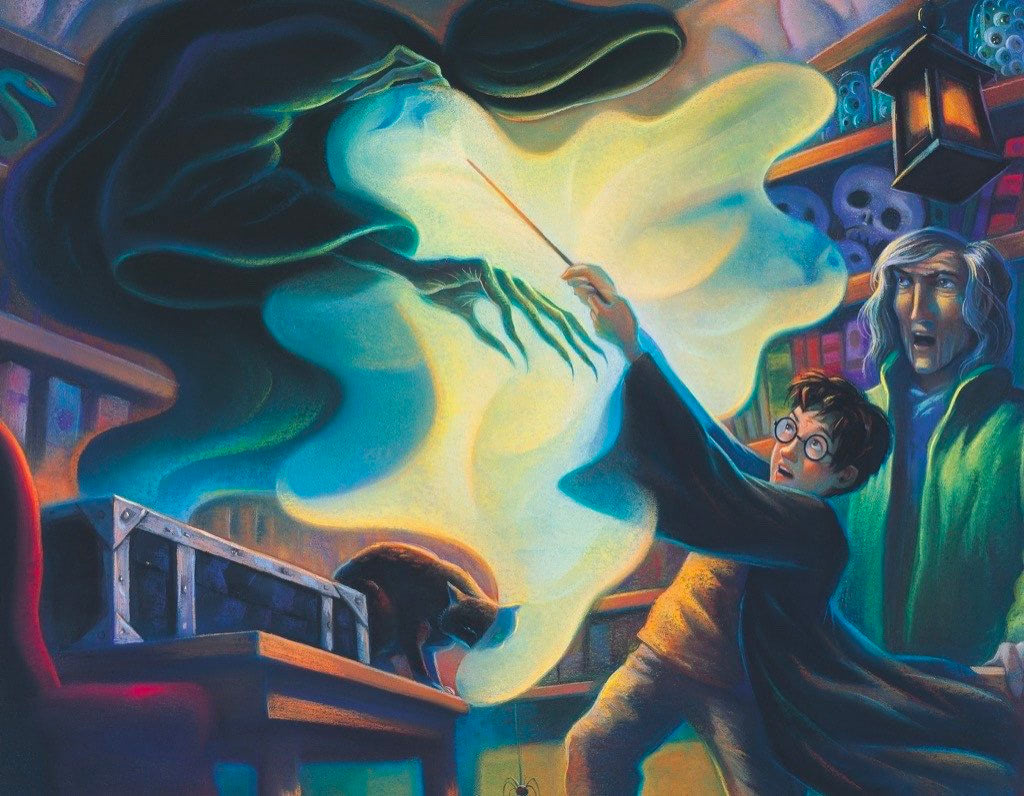
Elevating Trash

This column is a reprint from Unwinnable Monthly #157. If you like what you see, grab the magazine for less than ten dollars, or subscribe and get all future magazines for half price.
———
Examining trends in fanfiction.
———
Harry Potter is a divisive topic.
The frequent outcry on social media about Harry Potter is folks demanding that long-term fans should “read another book.” But that doesn’t get to the source problem. The statement shouldn’t be “read another book,” but rather “have you really read this book?” Not just a surface level read of “boy goes to magic school, and fights a war” – but have you interrogated the source material as a mature reader? Loving something is knowing it, and for a lot of Harry Potter fans, ignorance seems to be bliss.
This isn’t a piece about how J. K. Rowling hates trans people. That’s well established at this point, and honestly if you’re still allowing her to profit off of her work in 2022, that’s on you. Harry Potter is the media equivalent of still regularly going to Chick fil-A because you like the chicken – it’s removing the morality of the monetary impact of your decisions. You’re an adult. You can make whatever decisions you’d like but do so as an informed adult.
Harry Potter is a work of fiction that is incapable of interrogating its own problems, and despite the wide and well-loved greater wizarding universe, the world-building falls apart on closer examination. Fanwork has, for years, propped up a franchise that is effectively a house of cards of hot button trauma and mid-tier fantasy.
Fanwork is labeled as “derivative work” because it fundamentally builds off of a previously established work. There is an implication in the term derivative that the resulting product is somehow lesser, and sometimes that is borne out in the product. But there is one thing that Harry Potter fanwork does that J. K. Rowling has never done – actually interrogate and contend with the heavy issues she broaches.

Harry Potter, the character, is a child soldier. He’s not only a child soldier, he’s actually the second generation of child soldier – his parents die at 21 protecting him, and for their brief time in the series they’re shown to be constantly besieged. The series doesn’t know what to do with this. (For a counter, probably read K. A. Applegate’s comments on war and its effects after the conclusion of the Animorphs series aimed at the same age audience.) There are brief moments throughout the books where they hint at the loss of innocence of Harry – Mrs. Weasley trying to keep the children out of the strategy rooms in later books, Harry talking to Dumbledore on a ghostly platform when they’re both dead spring to mind – but the series doesn’t contend with those issues. It’s impossible to say that “Dumbledore is just as bad as Voldemort” when the writer has coded Voldemort as a Nazi. But Dumbledore raises two generations of child soldiers to fight a battle where it’s established that Dumbledore could act to end the war if he wasn’t so tied in his own morality. A morality that won’t allow him to raise his wand, but will allow him to raise children like sacrificial pawns. This doesn’t even get into the fact that he sends Harry off to be raised by incredibly abusive adoptive parents and doesn’t check on him for a decade. Fanfiction has, for years, used this childhood as a catalyst for a more morally grey Dumbledore than is presented in canon – someone who intentionally raised a child who would be moldable by virtue of his childhood abuse.
In the world of fan fiction, there’s a really popular tag called “Epilogue, What Epilogue?” or EWE, a sort of retcon for the entire end of Book 7. This is mostly because the Epilogue proves that J. K. Rowling doesn’t understand any of the themes that she’s established throughout the series.
The conclusion of the Harry Potter series has Harry becoming a high school dropout wizarding cop who goes on to marry his childhood best friend’s kid sister and give their resulting children names that I can only really describe as “weirdly white trash for a British children’s book.” (Strong Renesmee energy.) This ending is strange in the context of the rest of the book, but only if you value established writing standards. Throughout the series, Harry is shown in direct contrast to the government. Minor antagonists include several bureaucratic government officials, jailers (who are Dementors if not prison guards), and fascism – and yet when the story concludes, Harry becomes a cop. You usually don’t see this in fan work – there definitely are Auror Harry Potter stories out there. But a large point of the Harry Potter franchise is that Harry spent seven books having him fight the very system that he, as an Auror, in a thoughtless epilogue, now mindlessly enforces.
For a series that contends that “the power of love will prevail”, it frequently shows the opposite to be true. Love saves Harry from the death curse (and sorry every other child in this universe killed by the death curse, I guess your mom didn’t love you enough?) though the entire Horcrux thing awkwardly thrown into the last book even tries to undo that. But love doesn’t save Harry from a decade of abuse, love doesn’t save Sirius Black from a decade of horrific imprisonment and love doesn’t save Draco Malfoy.

Draco Malfoy is the least utilized character in a stable of underutilized characters in the Harry Potter franchise. If you wanted a clearer redemption arc, you could not have planned for one better than Draco Malfoy. But again, J. K. Rowling doesn’t know what to do with her own material. So instead, she focuses her redemptive energy on Severus Snape (more on that later). Back in 2014 she wrote that “Draco remains a person of dubious morality in the seven published books . . . all this has left me in the unenviable position of pouring cold common sense on ardent readers’ daydreams, as I told them, rather severely, that Draco was not concealing a heart of gold under that sneering and prejudice.” Frankly, this is bad writing. Draco is the principle minor antagonist in the series, and she made him a one-dimensional bully. She’s spent a lot of energy over the years establishing that she thinks that people who can see potential in Draco Malfoy are lusty teenage girls. Draco could have easily been a face for redemption, a fictional counterpart to someone like Derek Black, the son of the Stormfront founder and prominent Klansman and white nationalist, who found a way out of hate through friendship and love. Draco Malfoy is a child soldier for a eugenicist death cult. He’s a child. But because J. K. Rowling doesn’t know how to actually write nuance, she can’t see any gray in his story.
Fanfiction has found a lot of options through the years that she never imagined. Whether it be having him actually earn his redemption with our main characters, giving his character nuance as a father later, or having him fall in love and learn through a relationship that the ways he was taught as a child were abhorrent and harmed real people. There is a contingent of, for example, Draco/Hermione readers who are definitely in it for the dark romance, but there’s also a large chunk of readers who generally want to see more creative solutions to a character like Draco Malfoy – a scared kid forced into a corner by bigoted parents. We could’ve had a Prince Zuko redemption art, and in the end, J. K. Rowling gave us nothing but disdain.
Now onto the only Slytherin that JK Rowling thinks is worth saving: Severus Snape. I firmly believe that there would be very few Severus Snape lovers out there if not for the power of Alan Rickman’s incredible performance throughout the film series. The writing is just not good. Severus Snape is the equivalent of an edge lord Incel all grown up, and his redemption arc is nonexistent outside of J. K. Rowling stating it to be true. One of the golden rules of writing is “show not tell.” In the books, Snape is a cruel man who takes out his childhood anger on actual children. He’s a bully. His redemption can best be summed up as “sorry Harry, I thought your mom was super-hot when we were teenagers, and then she stopped talking to me because I called her a slur and I joined a death cult, the direct product of which ultimately led to her death.” This is his canon redemption arc. It’s incredibly weird. It’s unsettling, and it’s arguably a product of Rowling’s right-wing sensibilities that she thinks that the redemptive character in the series is an adult man who is cruel to children for the imagined sins of their parents’ friends. Every fandom take on Severus Snape is wildly ahead of Rowling’s own, whether it be actually giving him some agency as a double agent or giving him a more complicated arc as a trans man. All of them are better than canon.

There are plenty of other things I could cover in this – the slavery element, the anti-Semitism of goblin-kind, the entire Sirius Black arc, Hermione Granger being sidelined, Slytherin house in general, racism, Remus Lupin and Tonks and the necessity of making queer coded characters straight; this piece is just scratching the surface on the problems in the Harry Potter universe that Rowling is unequipped to handle.
This matters because people love Harry Potter. This series has such a long tail that in 2022, folks dress up en masse as her characters for Halloween. When I see wrap-ups of K-Pop idols they occasionally reference this universe. When I was a teenager in Japan, my host family’s daughter had been carefully translating the books with a binder of English slang she’d transposed in her own neat handwriting. There is a cultural relevancy to J. K. Rowling’s works, a ubiquity that stands the test of cultures and time – even if she is a reactionary asshat and a middling writer at best. Ursula K. Le Guin wrote that Rowling’s work is “stylistically ordinary, imaginatively derivative, and ethically rather mean-spirited” and often folks get hung up on the first half and somehow seem to miss the second half of that quote.
If you, dear reader, are someone who loves Harry Potter, do yourself the service of rereading the series as an adult. Interrogate it. Be prepared to actually know what you’re talking about. Because if you’re going to prop up a woman who champions the things that J. K. Rowling does, you should at least be able to say why you choose her universe over all others.
———
Amanda Hudgins is an occasional writer, former rugby player and wearer of incredibly tall shoes.




